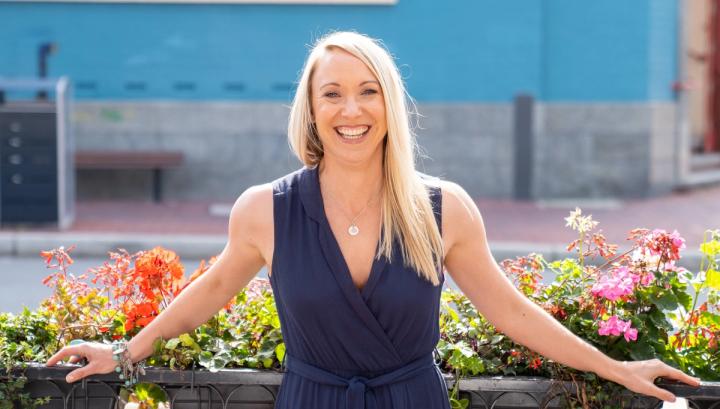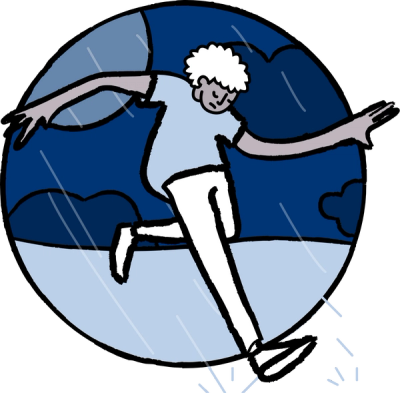Amanda's story
At 27, Amanda was trapped in the pursuit of career success. leading to burnout and depression. She hit rock bottom and contemplated suicide, feeling isolated due to stigma.
But Amanda didn't give up. Instead, she transformed from self-loathing to self-love. She discovered healing through mindfulness, meditation, and self-reflection.
Now, Amanda founded a mental health charity. She offers hope through peer support groups and workshops for those battling mental health issues.
Listen here
Watch here
Read transcript
Darcy: We acknowledge the lives lost to suicide and recognise those who have survived suicide attempts and those who struggle today or in the past with thoughts of suicide, mental health issues and crisis situations. We acknowledge all those who have felt the deep impact of suicide, including those who love care and support people experiencing suicidality and those experiencing the pain and bereavement through suicide. We respect collaboration with people who have lived or living experience of suicide and mental health issues and value their contribution to the work we do.
Amanda: Just by developing that mindset of curiosity gave me some space from all of the thoughts that I had been thinking that were not very positive, very helpful overnight, very kind.
Darcy: Welcome to Holding on to Hope, the series that shares the stories of everyday Australians that have experienced moments in crisis and found a path to support. Whilst all of the stories shared of hope and inspiration, at times, you may hear something you find triggering. If you or someone you know needs crisis support, please phone Lifeline on 1311 14 Text 0477 1311 14 or visit toolkit.lifeline.org.au for Lifeline chat service, which is 24/7.
Ruben: Hello, and thank you for joining me. I'm Ruben and I'm a volunteer telephone crisis supporter at Lifeline. I'm one of the voices you may hear if you call for support. At the age of 15, I lost my dear father to suicide. Ever since that fateful day, I always wished my father had the opportunity to talk to someone like me when he needed it the most. 13 years later, and four years into my journey with Lifeline, I'm now part of that opportunity and this is why I'm so passionate about hosting this series. If you're not quite ready to talk, perhaps you'll find comfort by listening to the stories of people who've experienced the value of reaching out for help.
At a young age of 27, Amanda found herself trapped in the pursuit of career, business and life success, which consumed her and let her down a path of burnout, despair, and ultimately into the depths of depression. When Amanda received the diagnosis, a revelation that she struggled to accept, she hit rock bottom and began contemplating taking her own life. The weight of stigma attached to depression and anxiety only deepened her inner turmoil, leaving her feeling isolated and misunderstood. But Amanda's story doesn't end there. Instead of succumbing to the darkness, she made a brave decision to take herself from self-loathing to self-loving. Throughout her journey, Amanda discovered an array of tools and practices that gradually led her towards healing. She found solace in mindfulness meditation and self-reflection, paving a path to self-discovery and growth. Today, Amanda is a proud founder of a mental health charity that serves as a beacon of hope for those navigating their own mental health battles. Through peer support groups, wellbeing workshops, and peer networking. She is providing a lifeline for others who are desperately seeking hope, and connection.
Thank you, Amanda, for sharing your story today and being part of the Holding on to Hope podcast. I really do appreciate your time and look forward to seeing more of your work, particularly in the suicide prevention advocacy space.
Amanda: Yeah, for sure.
Ruben: I'd sort of like to take you back to when you were at the age of 27. What was going on at that time of your life?
Amanda: I was on a mission, I was determined to be successful. And I had my five-year plan and my dreams and my goals all mapped out ahead of me. And I actually just started a new job, which I was hoping would be a long and fulfilling and very successful career. So I was really trying to prove myself as a new employee in that role and at the same time, I was also building an online business. This was way before online businesses were cool. So I was basically putting a lot of time and effort into work, I was working really hard. And I was on a mission to just get right in life, I really just wanted to be successful. And my working life was very demanding. It was quite an intense role. I just needed to try harder or do better or work more. So a lot of time and energy was going into that role. Also, my business wasn't really growing as quickly as I wanted it to so but it wasn't a work. I was working on my business and putting a lot of time and effort and energy into that. And I really was putting out a lot of energy and not getting a lot of energy back in. But I was so motivated to have this successful life that I just kept on pushing. And I actually had friends who started to ask me if I was okay. You know, it made me to slow down. Maybe I should take a step back. And dismissed them all and chose to just carry on. And I was lucky that I had a family friend recommended maybe I see a psychologist and I thought well, that sounds similar to business mentoring, I'll go and see a psychologist that will give me maybe some tools and strategies, so I can make some adjustments and then get on with life. And the first session with the psychologist actually completely changed my life when I thought what I was dealing with was maybe it was stress or burnout actually became exhaustion and led to deep, dark depression that completely derailed my life.
Ruben: Did you find those expectations were coming from the outside or within?
Amanda: It was probably a bit of both, I really wanted to be successful. And I had no idea of what success look like. And I felt so far from that because the gap was so great, it just, you know, caused this intense drive within me to get to a point where I could have this life and freedom and financial security and success. So a lot of that was self-driven and self-motivated. And I wanted to have a different life, I wanted to have this extraordinary life. And it was also the life that I've seen other people living. So it was definitely external and a lot of internal factors there.
Ruben: Were sort of the thoughts and the feelings you experienced during that period?
Amanda: I never imagined that I would find myself at the age of 27 sitting in our psychologists office, hearing them say, I think you're experiencing severe depression. My first thought was, no, I don't think so. Depression doesn't happen to people like me. I'm happy and positive and motivated, just not right now. And my second thought was, no, thank you. I don't want to be one of them. And I didn't actually have any reference point for thinking like that. I didn't know anyone with depression or so I thought, well, there was no family history that I was aware of. And so I really felt this intense shame and stigma of being unable to cope. I didn't understand how everybody else could cope with a demanding working life, but just not me or why was it that everybody else managed to build a business but I couldn't? Or why was it that everybody else seemed to be dealing with the demands of adult life, yet I somehow couldn't manage that. And that shame and stigma really just kept me silently suffering until you know, life became all too much. I really didn't understand why this was happening to me and what was going on. And because I felt that shame around being unable to cope, I really kept that to myself. And I didn't really tell anyone the depths of the struggle that I was going through.
Ruben: Can you tell us about the events or times for you leading up to your crisis point or your darkest time for you?
Amanda: Yeah, I think even six months leading up to the diagnosis with the psychologist, there was signs that I actually ignored. You know, as I said, I had friends and family asking, okay, I dismissed all of that, because I was on a mission to get there in life. I really started to feel more emotional, my emotions were more up and down and I'd get frustrated easily or annoyed about small things. I noticed that my energy just became fairly low. Like I just started to feel a bit more tired. I didn't have energy at the end of the day, but I pushed on anyway. My thoughts sounds more negative than usual but I managed to you know, reframe, and refocus and rephrase, and just just miss them all and carry on. And then I started to feel sick when I got to work, or I had business work to do on the weekend. But I pushed myself to keep going anyway. And then one morning, you know, I woke up feeling sick, unable to get out of bed, unwilling. And, you know, No, emotion to do anything about it. You know, my mom said to me, I think you need to come back home to live with us. And I reached a point where I was absolutely exhausted, depressed and depleted.
And I had to leave my job and was that kind of live with my parents and begin the process of unravelling what was happening to me and why. I left that job, but I didn't actually tell anyone. The real reason I was leaving, they all thought I was going to climb the career ladder somewhere else and all I wanted to do was climb into bed and never get out again. It was a really difficult time for me understanding what was going on. Why is this happening to me as well as my family and friends trying to understand know how to support me? Yeah, my mom would cook me nice healthy meals that I didn't need. My friends would invite me places I didn't go. They’d send text messages I didn't respond to. And my dad just held my hands as I cried, because that's the best that he could do.
And it was a really intense time for all of us, you know, I would sleep for 12 hours a day, and wake up tired, no motivation, no inclination, and no idea of how I was going to get out of the situation. But I really just felt consumed by this depression and despair and happiness and sadness and frustration. And it was day after day and then week after week, and month after month of just this darkness and exhaustion and struggle. And even though I was seeing my psychologist, and I was trying to take small steps forward, that would help me get better, I really wasn't making any progress. And I really wasn't happy about it. And I reached a point where I thought, I hate my mind, I hate my life. I hate myself for somehow ending up in this position. And I remember walking out into the kitchen one morning, I had 12 hour sleep, I woke up tired again. And I walked out into the kitchen, and my mom took one look at me, and she said, what's wrong love. And I said, I hate this. And I stormed off, and I was walking back down the passage to go back to sleep, I thought, I'm just gonna sleep the day away and hopefully wake up feeling something other than how I'm feeling. And my mom followed me. And she said again, you know, in that way only moms can, she said, what's wrong. And I remember turning to her through tears in my eyes and gritted teeth, I said, the thoughts in my head and making me feel like it'd be easier if I wasn't here. And as soon as I said that, I wished I could type the words back, because even though I've been thinking that way, which was scary enough, saying it out loud, made it feel real. And I could see the fear and pain in my mom's eyes that mirrored fear and pain that I have been feeling.
And also in that moment, I realised I needed to do something differently. And I knew that I didn't really want to die. And I knew I had to find a different way to live. And what I realised is that I hadn't actually accepted that I had depression, I've still been somehow wishing and hoping this won't all magically go away, and we can all forget this ever happened, and get back to normal life. And even though I was seeing my psychologist, I wasn't really doing the work to understand my thoughts and feelings and how I was thinking and how I was behaving. And so in that moment, I decided that I had to accept my depression. And then I had to make different choices. If I wanted to move forward, I couldn't wait for the external world to change, I had to start looking at my internal world. And I couldn't wait to be happy. When I got there, I had to find a way to be happy here. And that was really the kind of turning point for me in my recovery journey.
Ruben: What were some of the challenges you faced, in accepting your diagnosis and overcoming the stigma attached to depression?
Amanda: I really struggled with this self-stigma, I really felt like I had failed at life. And I think it was because I didn't know anyone. And with depression, I didn't really have any awareness or any understanding. And so I felt like it was just me like, why is it that I was just neither couldn't cope. And I think the shame of being unable to cope with adult lives really held me back from actually seeking help and telling people what I was going through. And yeah, I really felt like a failure. It was the exact opposite of everything that I wanted, and was trying to achieve in life. And I really just didn't feel good enough. You know, I was trying the hardest I could to succeed and have a different life. And I have completely failed at that.
And the embarrassment and shame that I somehow did something wrong. Like how did I end up here? Was there something that I could have done differently to avoid this? It was really all of that question. Without any really good answer. This really just kept me silently suffering because I couldn't see anyone else who had been through this or anyone who might have experienced this or anyone that I can even talk to who might be going through this. So I think it was just feeling completely alone in my journey and then really not understood, I didn't understand myself, why all these thoughts and feelings and you know, I could suddenly can change me and I couldn't cope with it. And other people also struggled to understand because I was so naturally happy and positive. Yes, I was very driven and ambitious. And so it was really hard for other people to see me differently. And that also took a while as well, probably because, again, I kind of shielded people from how I was really feeling. You know, my mom likes to remind me that I think there's a few things I've forgotten, but she remembers a lot of things that we went through together. And, you know, she tells me story of we're sitting on the couch one Friday night, I was exhausted, you know, kind of teary and upset and a friend would call me, ‘How are you going’, and I’d be, Yeah, just at home, having a quite weekend’. Okay, sounds good weekend, and my mum would look at me go, what was that? And I thought, well, I don't need to tell everybody that I am struggling and have no life and feel a bit helpless and hopeless. So lost. So I think it was that almost self-preservation. But yeah, also just such a shame and stigma of just not being able to cope with life.
Darcy: We hope you're enjoying this episode, Lifeline’s new Support toolkit makes it easier to care for family, friends and loved ones, and look after yourself along the way, visit us at toolkit.lifeline.org.au. Now, back to the episode.
Ruben: What was your first step in reaching out for help?
Amanda: It really was finding the psychologist that was probably the first step that I took. And I was lucky to have a family friend recommend me to someone so that made it a whole lot easier to actually find the support, and just being able to talk to someone and just get everything out of my head. And really just get a different perspective on how I was thinking and how I was feeling and give me you know, some tools and strategies. I say, my psychologists saved my life but she says that I saved my own life. But that really was one of the first things that helped me to start to understand, you know, what mine was going through. And as I started to feel more comfortable, I then told a couple of friends what I was going through and how I was really feeling and I had a friend tell me that they had been through the ride of depression and anxiety. And so I that was a major catalyst in my recovery, as well actually having other friends that I could talk to you that understood what I was going through. So it really was looking for that support. And then slowly starting to have a couple of people that I could trust that I felt comfortable with, to just have other people to talk to you and kind of share the journey with.
Ruben: What are some of the practices and tools that helped you in your journey?
Amanda: Therapy therapy and therapy. One of the first things my psychologist told me to do or taught me to do was to become an energy investment banker. So I had to look at any invitation activity event or anything that I wanted to do. From that perspective on wellness, add energy back to my happiness bank account, my well being bank account, my mental health bank account. So I had a different lens at which I looked at my life through. I only chose to engage in things that would actually give energy back to me. So I really had to start with building up my energy reserves. And then that will give me a greater capacity to deal with what I was going through and then a bit more motivation. To engage in dialogue. Once I had a bit more energy, I then really had to look at developing an attitude of gratitude, like, I had to find the smallest thing every day to be grateful for so I actually started to focus my mind on looking forward and looking for the goal rather than the current really challenging circumstances that I was in. And sometimes that was the fact that the dog was happy to go for a walk even though I really wasn't or the fact that I was sitting in the sun enjoying a cup of tea or I really felt like eating dinner that night. Whereas every other night I wasn’t really interested, like it was the smallest thing that I could find to be grateful for that just started to focus my mind in a different direction. I then I had to start going a bit more movement and because I was so exhausted, I went to a GP and he said, for people with chronic fatigue, he just said to do a 10 minute walk, I thought that's ridiculous. I used to exercise for an hour a day. And you told me just to do a 10 minute walk. But I was so determined to recover, that I thought, well, I'm going to do it and I set the alarm on my phone, I'd walk five minutes, and the dog was kind of like, ‘Are we be going back now?’, you know, turn around, and then come back again, I had to start off with really small steps. And I think one of the biggest things was, I call it learning to manage my monkey mind. Yes, had to start applying some tools and strategies to understand how I was thinking, and how my thoughts were making me feel, and then how was I feeling and how those feelings and making me behave? And I really just had to become curious, like I always say, approach conflict with curiosity. So can I be curious about thoughts that I'm thinking? Do I have to believe every thought that comes through my mind when we have like 7 000 thoughts a day? Do I know that to be true? Can I know that will actually happen in the future? And just by developing that mindset o curiosity gave me some space from all of the thoughts that I had been thinking that we're not very positive that we're not very helpful, or we're not, you know, they're kind. And then just getting into a bit more of a routine as well, even though I was still sleeping for 12 hours a day, and I didn't have jobs, I didn't really have anything to do. I tried to develop a routine around the things that I were doing. So I could feel like I have some structure to my life, and to feel like I was moving forward and actually making some progress. So those were really the key things that I started to do, that then helped me to recover.
Ruben: What forms of supports do you draw now, that helped when you're having a difficult time, your non negotiables?
Amanda: My energy levels are still my biggest indicator. So if I start to feel tired, or notice I'm getting a bit more frustrated, or I'm getting a bit rundown, those are ones my biggest indicator of how I'm troubled, and maybe I need to take a step back. And so if I start to feel, you know, not great, or my energy is getting a bit low, I kind of look at my calendar and go, alright, what can I cancel? How can I pull back and just give myself some time and space to just build those energy reserves up again. So my energy is like my first indicator of you know how I'm travelling. And I'm actually only started doing yoga when I experienced depression, because I needed something to help slow my mind down. And that really helped me to get out of my head into my body, do some breathing. And I really still love yoga to this day. It's like a pillar of my mental health management. And that just gives me that sense of balance and calm. And I also started doing meditation, to just learn some more strategies as well, to kind of find that calm in the storm. You know, after going through depression, I got to a point where I was just happy, being happy. And when I'd be happy for a long period of time, I thought wow, this is it. I kind of stabilised and I'm happy but that life is always up and down. And I really found that meditation gave me that ability to kind of stay on that middle word when things are happening in a lot. It really gives me that calm centre that I can anchor to and yet as well just continuing to do movement anyway like we move our body is really good for our mental health and as well on finding your tribe like having those people around you that you can go hey, I'm not feeling great today. Or and people you can really share honestly, how you're feeling that I think is a major catalyst and you know, real support for people as well. And I have a saying, circumstance that I really love. Sunday is like no plans, no technology, no routine, just wake up and see what you feel like doing. So I really make space in my calendar for just that complete downtime.
Ruben: If you could tell your 27-year-old self anything, what would it be?
Amanda: There is no hurry. You know, you don't have to try so hard. You don't have to push so hard. There's no hurry to get then in a lot, and also, that the best things of your life can actually come from the most challenging circumstances. So how to see a challenge or a difficult circumstance you're going through. And it's happening for you, and not to everything in your life. If you can look at it through a lens of how is this happening for me, that will give you a better ability and a better perspective in how do you deal with this. I don't know if my, my 27 year old self wouldn't have probably listened to any of these things. But you're good enough, just the way you are. That I think was really the underlying lack of self-worth, and self-confidence and self-esteem that I just didn't feel good enough at thought that when I achieved all these things, and I had all of this success, then I'd feel good enough. But we are really all, you know, good enough and complete and whole, just the way we are. And so if I could have found that within myself, earlier, or without going through this experience, my life would be a whole lot different. And I think I can now hand on heart say that my depression, although it was my greatest challenge, it was the greatest gift. And it changed my life in ways that I could never imagine. I've had experiences that I couldn't have written on my vision board. And I've really found community and friendships that I will have forever from the experience that I've been through and all the different things that have happened since.
Ruben: We really appreciate you being on the podcast and with your work with the mental health advocacy space and what you do for suicide prevention, depression, anxiety, and to help people in need. So thank you so much, Amanda.
Amanda: Awesome. Thanks for having me.
Darcy: Thanks for listening to Holding on to hope the podcast. Lifeline is grateful to all holding on to hope participants for choosing to share their personal lived experiences openly and courageously in order to offer hope and inspiration to others. Your act of kindness makes for a better world. And remember, you don't have to struggle. Visit toolkit.lifeline.org today.





